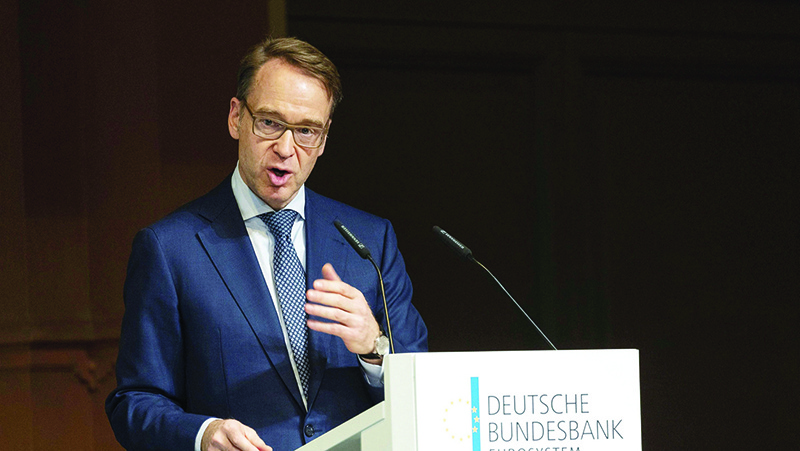 FRANKFURT: The Bundesbank expected Germany to grow by 4.2 percent in 2022 on a seasonally adjusted basis, down from a previous forecast of 5.2 percent, made in June this year, said Bundesbank President Jens Weidmann said.
FRANKFURT: The Bundesbank expected Germany to grow by 4.2 percent in 2022 on a seasonally adjusted basis, down from a previous forecast of 5.2 percent, made in June this year, said Bundesbank President Jens Weidmann said.FRANKFURT: The German central bank on Friday lowered its outlook for growth in Germany next year and upped its inflation forecast, as supply chain bottlenecks and the pandemic put Europe’s biggest economy under pressure. The Bundesbank expected Germany to grow by 4.2 percent in 2022 on a seasonally adjusted basis, down from a previous forecast of 5.2 percent, made in June this year.
“The recovery has been somewhat pushed back,” outgoing Bundesbank President Jens Weidmann said in a statement. In June, the Frankfurt-based institution had predicted that the economy could reach its pre-crisis level from the end of 2019 “this summer”.
But the anticipated recovery failed to materialize, with the economy still lagging behind the pre-pandemic marker by one percent in the third quarter of 2021, according to the Bundesbank.
Germany suffered a “pandemic-related setback” in the second half of 2021, the bank said, revising down its estimate for growth in 2021 to 2.5 percent from 3.7 percent. The country has imposed new health restrictions as it contends with a punishing fourth wave of the coronavirus, barring unvaccinated individuals from non-essential commerce and many public venues.
Growth would “gather pace again in early 2022”, as the restrictions fell away and the supply situation improved, the bank foresaw. As such, it raised its prognosis for 2023 to 3.2 percent from 1.7 percent, and forecast 0.9 percent growth in 2024.
Difficult climate
The Bundesbank’s predictions were nonetheless more optimistic than those of Ifo, a leading economic think-tank. The Munich-based institute on Tuesday downgraded its forecast in Germany in 2022 to 3.7 percent from an earlier estimate of 5.1 percent.
The new release of its closely watched business climate tracker added to a difficult picture for the economy as a whole. The indicator fell to 94.7 points in December, having sat at 96.6 the previous month. The German economy was “not getting any presents” for Christmas, Ifo president Clemens Fuest said in a statement, as pessimism about the outlook for next year increased.
“The deteriorating pandemic situation is hitting consumer-related service providers and retailers hard.” While the mood amongst manufacturing companies improved for the first time in five months, despite a perceived aggravation of supply issues, sentiment in the services sector “nosedived”.
“The German economy ends the year with another disappointment,” said Carsten Brzeski, head of macroeconomics at ING. “The fourth wave of the pandemic could now actually push the economy to the brink of stagnation, or even into a technical recession,” despite the economy’s greater resilience to coronavirus-related restrictions, he said.
Government boost
In its forecast, the Bundesbank was not able to take into account the new government’s plans to ramp up investment in projects related to the climate and digitalization. The planned investment could lead to “noticeably stronger real GDP growth” from 2023, the Bundesbank said.
On inflation, recent figures had pushed the rate “significantly higher than expected in June”, the bank said. The acceleration was “not just down to one-off effects” like a temporary VAT reduction by the government last year to boost the economy in response to the pandemic.
Rather it was pushed by a “surprisingly strong” increase in energy prices and the impact of shortages in supply. Consumer prices would rise by 3.2 percent on an annual basis this year, it estimated, followed by a rise of 3.6 percent in 2022.
Previously, it had been pencilling in inflation rates of 2.6 and 1.8 percent respectively.
Weidmann, who will step down at the end of the year, handing over his seat on the European Central Bank’s governing council, said that “monetary policy should not ignore these risks and remain alert”.
On Thursday, the ECB signalled a “step-by-step” reduction in its bond-buying stimulus program, putting interest rate hikes that other central banks have decided on to fight inflation some way off. —AFP










